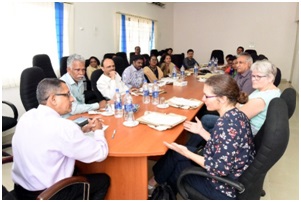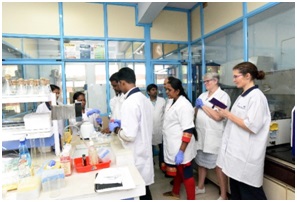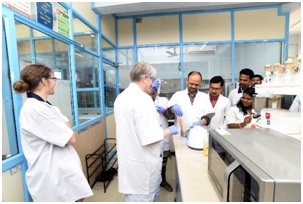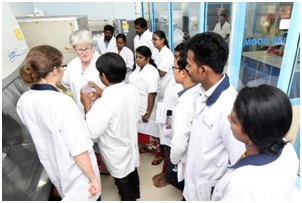Training on Antibiotics Residue Screening Conducted at ICAR-CIFT
Antibiotics residues in food products (Aquaculture, dairy, poultry etc.) are a great concern for importers and consumers due to its adverse effect on human health. Therefore, its regulation, monitoring and screening are very essential for the safety of the consumers. In this perspective, a training was organised by Food Safety and Standard Authority of India (FSSAI) along with ICAR-CIFT, Cochin and RIKILT University, The Netherlands at ICAR-CIFT, Cochin during 26 February – 2 March, 2018. A total of 10 participants from ICAR-CIFT, EIA and State Departments of Kerala were trained on antibiotic residue analysis using microbiological methods. Dr. Mariel Pikkemaat and Mrs Wilma Driessen were the expert trainers. The training was structured with theory and practical sessions as well as hand-on practices.
The training focused mainly on screening of antibiotic residues by microbial plates technique using specific bacterial strain. The antibiotic groups under consideration were Macrolides and β-lactams (Micrococcus luteus ATCC 9341), Tetracyclines (Bacillus cerecus ATCC 11778), Quinolones Yersinia ruckeri NCIM 13282), Sulfonamides (Bacillus pumilus CN 607) and Aminoglycosides (Bacillus subtilis BGA). The sample matrixes used during the training was chicken (farmed) and fish (wild caught). The course included standards calculation and preparation, spiked sample preparation and results interpretation inter-alia other routine programmes which was interesting. The participants were taught about the inoculum preparation, media preparation etc. Performing the assay was a great challenge because occasionally the results were misleading. A slight variation in the pH, inoculum volume, buffer quantity etc. may affect the sensitivity of the test. Sometimes presence of antibiotic in the spike control sample affected the results of the assay and needed to be cross checked. Food safety regulation for residues on animal products, identification, confirmation and quantification of antibiotics were also discussed in detail during the course. Validation (EU Decision 2002/657) and accreditation were also covered. Theoretical aspects such as quality control, ruggedness testing and other alternative methods and their limitation were discussed. The trainees observed that the programme was very much useful and the knowledge gained will be helpful for the future work.











